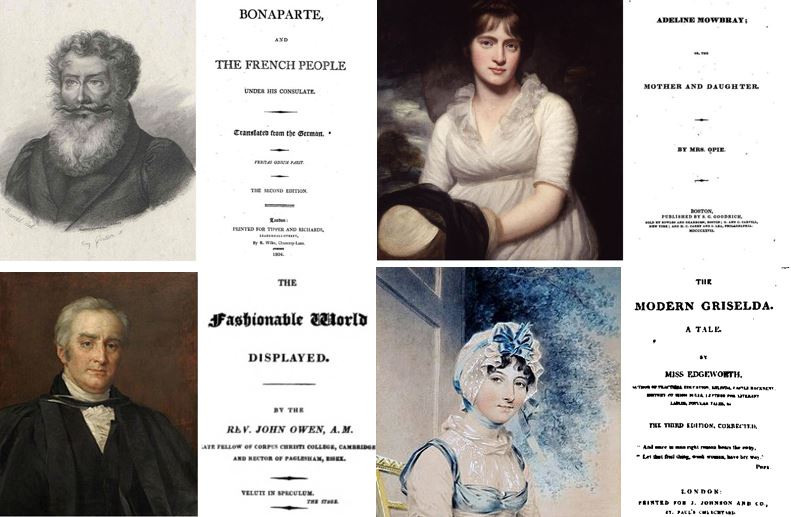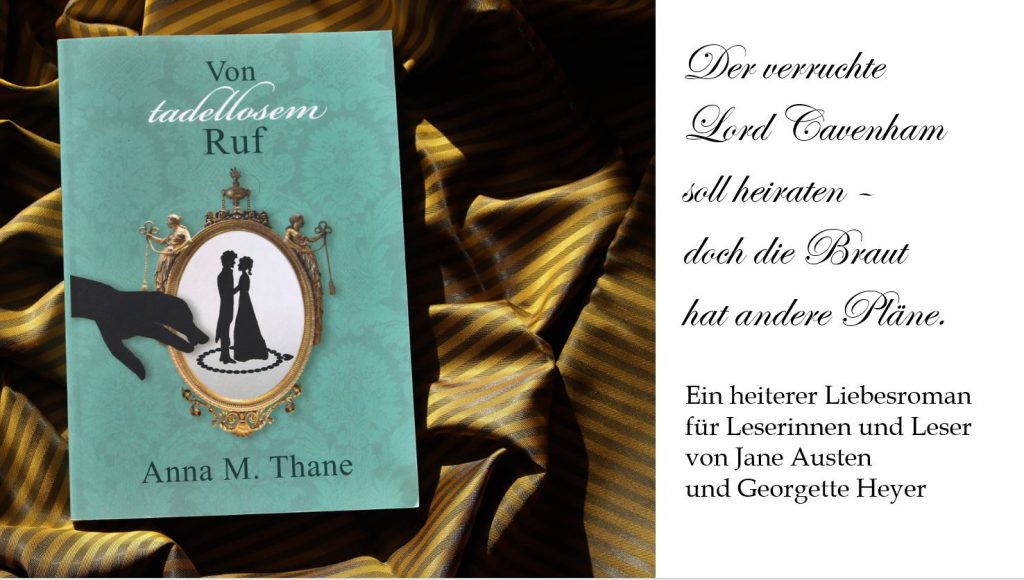
In 1804, Britain is uneasy. The short peace of Amiens ended the previous year, and now war is escalating in Europe again. Napoleon keeps a large army at the Northern coast of France. The British government builds small defensive forts to protect the coasts of south east England and Ireland against the threat of a French invasion. In December, Spain will again declare war on Britain. What can you read to distract the mind in these difficult times?
In 1804, 73 new novels wait for readers, and of these, 14 % are Gothic. The output of new Gothic novels is in decline (1803: 24 % of 79 novels were Gothic). But this doesn’t mean the end of the fascination with monks, castles and Italian counts. On the rise is easy reading-fodder in the shape of the so-called blue book: short, cheap abridgements or even only summaries of full-length gothic novels.
With regards to the other genres of fiction, translations from French and German authors sell well. British female authors are also in high demand, the most celebrated are those who hold-up high moral values in their stories. Nevertheless, proto-feminist literature and works by so-called bluestockings drive discussions about the role and rights of women.
Check out my selection of popular fiction and non-fiction releases. I have added links to online versions of each book, so you can actually read like its 1804.
1. A Lovers’ Quest
The Lake of Killarney / Anna Maria Porter (1778–1832)
The young and fair authoress published her first work at the age 14. Being a very prolific writer, “The Lake of Killarney” is already her fourth book, and it has what it takes to become a success:
It’s October 1793 at Castle-Connel in Killarney, Ireland. Rose De Blaqueire, a twenty-something orphaned girl, meets her long-lost love, Felix Charlemont. Misunderstandings prevent them from realising the strong emotions they still hold for each other. It takes sickness, faints, accidents, etc to bring Rose and Felix to confess their love. But fate strikes again: Felix has to go to war, and when his elder brother dies, Felix inherits the title. When he finally returns home to find his Rose, she is nowhere to be found, until …
But read that for yourself online here:
https://archive.org/details/lakekillarneyan00portgoog/page/n4/mode/2up
2. A Scandalous Life?
Adeline Mowbray, or, The Mother and Daughter / Amalia Opie (1769 – 1853)
Food for scandalmongers: The latest book by bluestocking and abolitionist Amalia Opie is based on a true story! It leads us into the radical era of the 1790s, where the heroine lives outside marriage with a philosopher. Yes, you guess right: the novel is loosely based on the relationship of Mary Wollstonecraft and William Godwin. Society is shocked by this satire on its attitudes to education, women, marriage, and the struggle to justify individual choice.
Read it online: https://archive.org/details/adelinemowbray00mowbgoog/page/n6/mode/2up

3. An amiable heroine
The Woman of Feeling / William-Henry Ireland (1775 – 1835)
T-h-e literary scandal of the age busted 8 years ago, and here is an honest work by the man who caused the “Great Shakespeare Fraud”! William H. Ireland (who, in the tender age of 19, forged letters and plays by the Bard) now has to make a living by writing poetry and fiction. Does his notoriety help him to win your attention for his books? To the Literary Journal, the main character of his novel appears so amiable that they already look forward to the next book by the author.
Read the novel online: https://babel.hathitrust.org/cgi/pt?id=uc1.31175035203804&seq=5
Read more about William H. Ireland’s forgeries: https://www.smithsonianmag.com/history/to-beor-not-the-greatest-shakespeare-forgery-136201/
4. Napoleon exposed!
Bonaparte, and the French People under his Consulate / Anonymous
This polemical yet scholarly anti-Napoleon book is a translation from the German. It’s first edition was sold-out in Britain within five weeks. The Monthly Review is in high praise and dedicates seven pages to quoting from the book.
The book also causes a stir on the Continent, as the author uncompromisingly states that Napoleon is becoming a major threat for democracy in Europe. It exposes the brutality of the authoritarian Napoleonic tyranny even before he has crowned himself Emperor of The French. Allegedly, Napoleon has ordered to suppress the original work and to search bookseller’s houses for every copy.
The author preserves his anonymity, but it soon transpires to everyone but the French censors that he is Gustav Graf von Schlabrendorf, a cosmopolitan and eccentric living in Paris right under the noses of the authorities. The musician Johann Friedrich Reichardt had smuggled the manuscript out of France and saw to its publication.
Read it online: https://books.google.de/books?id=aC1bAAAAcAAJ&printsec=frontcover&hl=de&source=gbs_ge_summary_r&cad=0#v=onepage&q&f=false

5. Never mind the critics?
Amazement / Elizabeth Meeke (1761 – 1826)
As an avid reader, you know Mrs Meeke as the era’s foremost writer of countless cheap novels. Did you know she also was a proficient translator? In 1804, she translates one of the latest works by the famous Continental novelist August La Fontaine – who could count Napoleon among his readers. Besides, she publishes four novels from her one pen this very year.
Her novel “Amazement” – about two brothers, alienated by matters of money and the scheming of the elder against the younger – does not find the favour of the critics. The Literary Journals notes rather darcy-esque:
“It was amazing how people could set down and write such an amazing nonsense, and still more amazing that any body should read it. (…) It is perhaps but justice, however, to say that this isn’t the worst (story) of the kind, and that if the authoress had confined the story to one third of its present size, it might have been tolerably interesting.”
Read “Amazement” online: https://www.google.de/books/edition/Amazement_A_novel/X-9t28b-IDsC?hl=de&gbpv=1&dq=inauthor:%22Mrs.+Meeke+(Elizabeth)%22&printsec=frontcover
If you prefer her translation of August La Fontaine’, you can read “Lobenstein Village” here: https://www.google.de/books/edition/Lobenstein_Village/66MyAQAAMAAJ?hl=de&gbpv=1&dq=inauthor:%22Mrs.+Meeke+(Elizabeth)%22&printsec=frontcover
6. A Satire on Fashion
The Fashionable World Displayed by “Theophilus Christian, esq.” / John Owen (1766–1822)
An Anglican priest looks at the Fashionable World as if it was a foreign country. He discusses manners and language, government and laws, religion and morality, and dress and amusements. The charming idea partly caused amused smiles, partly rolling eyes. It depends on the reader’s sense of humour. Owen can’t have done too badly. The books was published in its 8. edition in 1817.
Read it online: https://www.gutenberg.org/files/62238/62238-h/62238-h.htm

7. Inheritance and Entanglement
The Unexpected Legacy / Rachel Hunter (1754 – 1813)
Rachel Hunter’s novels are a favourite of genteel readers. Do as the family of Jane Austen had done: Read it out aloud at home, and laugh about the sentimental scenes. Once, Jane Austen even composed a mock fan-letter to Mrs. Hunter.
Critics welcome “The unexpected legacy” as an agreeable change from the usual set of Gothic monks and Italian counts. All characters are derived from ordinary life, and so is the plot: Narrator Mrs Sedley is the joint executor and chief beneficiary of a will. She thus becomes involved in the fate of the parties mentioned in the document. Find out how she deals with the task, and read the book online here: https://www.google.de/books/edition/The_unexpected_legacy/OKH_nmhxv1kC?hl=de&gbpv=1&dq=inauthor:%22Rachel+Hunter%22&printsec=frontcover
8. A Woman of Power
Memoirs of the Life of Agrippina, the Wife of Germanicus / Elizabeth Hamilton (1756 – 1816)
Elizabeth Hamilton’s literary star shines on with this brilliant mix of a biography and a novel: She brings strong but tragic Agrippina, sister of Cesar, to life in her admirably portrait. Besides, Hamilton’s detailed account of political intrigue and military conquest provides a full picture of the ancient Roman Republic. Critics celebrate her deep understanding of Roman laws and customs.
Elizabeth Hamilton, writer, intellectual and educationalist, feminised ‘masculine’ discourses, and showed a way for women to take part in discussing philosophy, theology, and history. She was a role-model of the new intellectual but domestic woman.
Read it online: https://archive.org/details/memoirsoflifeofa03hami/page/n7/mode/2up
9. An Insider’s Account of China
Travels in China / John Barrow (1764 – 1848)
This insider’s account takes you to distant, magnificent China! John Barrow gained first-hand-experience as a member of the first British embassy to China. Join him on his journey to Pekin, to a Country Villa of the Emperor and to the Province of Canton. Read about manners and amusements of the Court, and marvel at fine arts, science and medicine.
Read it online: https://www.gutenberg.org/files/28729/28729-h/28729-h.htm

10. A Matter of Choice?
The modern Griselda / Maria Edgeworth (1767 – 1849)
The most celebrated English novelist of her time takes on the famous folklore story about the patient and submissive Griselda (originally by G. Chaucer): Griselda is a poor peasant girl who marries a nobleman. He makes her vow to never question him and to remain absolutely loyal. Then he puts her through a series of tests in an attempt to shake her loyalty.
Edgeworth asks: Would women of her own time react differently than their medieval counterpart? She thus opens a debate about ideal female conduct and essential feminine nature.
Read it online: https://archive.org/details/moderngriseldata00edgeuoft/page/n5/mode/2up

11. Murder in Venice
The Bravo Of Venice / Lewis, Matthew G. (1775-1818)
In the dark alleys and back streets of Venice lurks an uncontrollable evil … Matthew “Monk” Lewis is back with the translation of a historical novel by Heinrich Zschokke.
The plot: A ruthless and hideous one-eyed assassin, armed with a dagger and wrapped in a dark mantle, lurks in the shadows along the canals of Venice. Simultaneously, a newcomer causes a flutter among the Venetian ladies: a devastatingly handsome Florentine nobleman of elegant manners. He falls in love with Rosabella, the Doge’s niece. Alas, deadly conspiracies are spun against the life of the Doge and the constitution of Venice …
Read it online: https://books.google.de/books?id=B0CF0-X3cr0C&printsec=frontcover&hl=de&source=gbs_ge_summary_r&cad=0#v=onepage&q&f=false
12. How to run an army
A Systematic View of the Formation, Discipline, and Economy of Armies / Robert Jackson (1750–1827)
Jackson, a physician-surgeon, saw active service in Holland and in the West Indies. The acquired experience is the basis of his work: He compares armies of several nations and discusses topics such as formation, uniforms, accommodation, dancing, drink, cleanliness etc. He also takes up military medical arrangements.
Please note that his views about class and race are very outdated for our today’s understanding.
Read it online: https://books.google.de/books?id=TSgAAAAAQAAJ&printsec=frontcover&hl=de#v=onepage&q&f=false
Related articles
Article by Anna M. Thane, author of the novel
“Von tadellosem Ruf” (http://amzn.to/2TXvrez)

